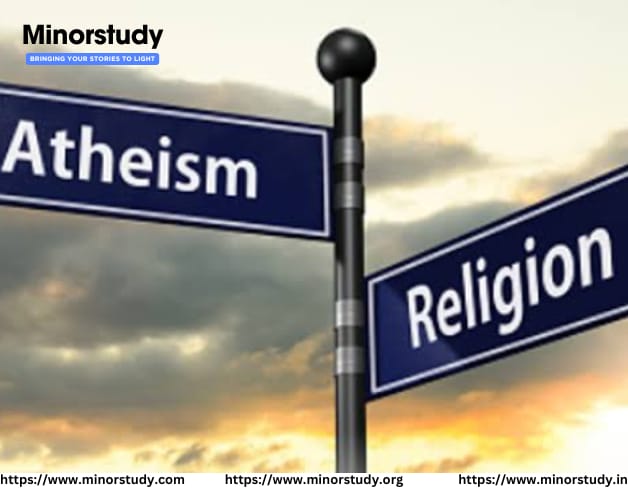Eye‑Opening Truths About Choosing Between Atheism and Religion (Positive sentiment: Eye‑Opening)
🌍 Introduction: Two Paths to Meaning
Life often presents us with two broad perspectives:
Religion—seeking connection through faith, ritual, and a higher power.
Atheism—finding meaning through reason, evidence, and human-centered ethics.
This article dives deep into both—showing how each path evolved, what drives people toward them, how they shape our lives, and why the choice matters today.
📜 History: From Ancient Belief to Modern Skepticism
🛕 Origins of Religion
Humanity’s spiritual roots stretch back to prehistoric animism—where fire, earth, and ancestors were worshipped. Organized religions emerged with civilizations like Egypt, Mesopotamia, and the Indus Valley, each assigning divine roles to natural forces.
🤔 Rise of Atheism
Ancient skepticism: Around 6th century BCE, Indian schools like Carvaka and Greek philosophers like Epicurus questioned gods en.wikipedia.org+13ancientworlds.net+13euvolution.com+13dudeoi.comknowledge.deck.no+2knowledge.deck.no+2psychstory.co.uk+2.
Renaissance & Enlightenment: Figures such as Spinoza, Diderot, Voltaire, and Hobbes shifted the discourse toward secular critique, treating atheism as a challenge to religious authority .
19th century: With Darwin’s evolutionary theory, Marx’s critique (“religion is the opium of the masses”), and Nietzsche’s “God is dead”—atheism gained intellectual traction knowledge.deck.no.
20th century: State atheism in the USSR saw militant suppression of religion—exemplified by campaigns under Khrushchev and the League of Militant Atheists en.wikipedia.org+6en.wikipedia.org+6en.wikipedia.org+6.
Modern “New Atheism” led by Dawkins, Harris, Hitchens, and Dennett promotes overt critique of religion knowledge.deck.no+3en.wikipedia.org+3eyeofunity.com+3.
📅 Timeline: Highlights of Contrast
| Period | Key Milestones |
|---|---|
| Prehistoric–Ancient | Animism, polytheism, early skepticism |
| 16th–18th Century | Enlightenment thinkers challenge theology |
| 19th Century | Darwin, Marx, Nietzsche shape atheist philosophy |
| Early 20th Century | Soviet state-enforced atheism; religious persecution |
| Late 20th – 21st Century | Rise of New Atheism; global secularization trends |
| 2007–2024 | Rise of “nones”; UK and US non-religious majorities knowledge.deck.no+3planet92.com+3sourastra-das.medium.com+3axios.com+1apnews.com+1 |
📊 Facts That Matter Today
Secular Surge:
In the UK, over 50% identify as non-religious as of 2017 conservapedia.com+7thetimes.co.uk+7thesun.co.uk+7.
In the US, 28% are religiously unaffiliated; non-belief is growing rapidly axios.com+1euvolution.com+1.
Atheism Isn’t Immoral:
Studies show atheists are as moral and ethical as religious individuals, without a link between disbelief and wrongdoing en.wikipedia.org+13thetimes.co.uk+13dudeoi.com+13.Context Shapes Well-Being:
Religious involvement boosts happiness in devout societies, while in secular countries, happiness is similar between believers and non-believers knowledge.deck.no+2time.com+2knowledge.deck.no+2.Economic Influence:
Atheist-majority nations tend to be wealthier, have lower crime, and higher education levels .
🌐 Why It All Matters
🧭 For Individuals
Lifestyle & Ethics: Religion offers ritual and community, atheism emphasizes autonomy.
Mental Well-Being: Community and purpose from religion; personal meaning and logic in atheism.
Belief in Afterlife: Religion brings comfort in death; atheism demands facing mortality without divine promise.
🏛️ For Society
Governance & Equality: Atheistic ideals support secular, evidence-based policy; religion may influence laws (e.g. abortion, marriage).
Social Harmony: Religious communities foster solidarity; atheism encourages pluralism but may lack communal bonds.
Conflict Dynamics: Religion sometimes fuels conflict, but can also inspire peace movements; atheistic regimes sometimes led to oppression (e.g. USSR) .
📌 Observance and Daily Practice
Religious Life
Worship routines—church, mosque, temple—or personal rituals at home.
Community service, festivals, prayer, scripture study.
Shared identities and moral frameworks.
Atheistic/ Secular Life
Regular reflection, mindfulness—no deity needed.
Ethical participation in activism and volunteer groups.
Community through clubs, support groups, secular rituals.
💬 Heartfelt Wish
“May you walk your chosen path—whether it’s the faith-filled journey of religion or the reasoned clarity of atheism—with respect, openness, and the freedom to find meaning and connection in a world rich with diversity.”
❓ FAQs
Q1: Can you be an atheist and still have moral values?
Absolutely. Ethics can derive from empathy, reason, and societal contracts, not only Scripture.
Q2: Is atheism just another belief system?
No—atheism is a lack of belief in deities. It doesn’t prescribe moral or existential systems. Many atheists adopt secular humanism.
Q3: Do atheists reject spirituality entirely?
Not always. Some identify as “spiritual but not religious”—valuing awe, meditation, or human connection without supernatural belief planet92.com+15apnews.com+15dudeoi.com+15planet92.com+2dudeoi.com+2knowledge.deck.no+2ancientworlds.net+1knowledge.deck.no+1time.com.
Q4: Does religion make people happier?
In religious societies, yes—it fosters belonging. In secular nations, non-believers find similar well-being .
Q5: Which path is “better” for society?
Each has strengths: religion builds community and moral traditions; atheism fosters critical thinking and secular fairness. A mixed, respectful coexistence is often healthiest.
🌟 Important Points to Remember
Both paths are historically rich and valid.
Religion and atheism answer different human needs: belonging vs. autonomy.
One isn’t inherently superior—both offer purpose, ethics, and community.
Modern societies often blend religious norms with secular governance and individual freedoms.
Understanding each other reduces conflict and promotes harmony.
🔚 Conclusion: One Shared Goal—Human Flourishing
Religion and atheism aren’t enemies—they are distinct lenses through which humans pursue meaning, values, and connection.
Religion nurtures community, ritual, and transcendence.
Atheism nurtures reason, accountability, and personal meaning.
When both paths respect each other’s choices, society gains: enhanced empathy, ethical depth, and freedom—not just to believe, but to live with purpose.








